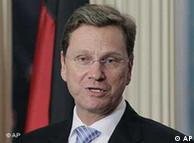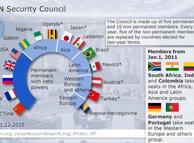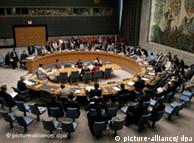UNITED NATIONS | 13.10.2010
Germany to use its UN Security Council seat to make case for reform
German Foreign Minister Guido Westerwelle wasted little time after his country was elected to a non-permanent seat on the United Nations Security Council.
Speaking on Germany's ARD public television network, Westerwelle reiterated earlier comments calling for major changes to the Council. The foreign minister criticized what he said was the lack of representation for certain regions of the world.
"It is not appropriate that two continents, like Africa and Latin America, do not have permanent seats on the UN Security Council. Asia, too, rightfully views itself as underrepresented," the German foreign minister said.
"That is why any reform of the United Nations is not first and foremost about a permanent seat on the Security Council for us, but rather about a better reflection of global distribution of power," Westerwelle emphasized.
 Germany will 'justify' the UN's 'vote of confidence'
Germany will 'justify' the UN's 'vote of confidence'
Germany, on Tuesday, won election to one of two non-permanent seats on the UN Security Council assigned to Western nations. Portugal was awarded the other seat, after Canada withdrew its bid following two inconclusive rounds of voting.
All three nations had campaigned to represent the regional area called Western Europe and other Groups (WEOG).
Foreign Minister Westerwelle called the UN's selection a "significant vote of confidence" and pledged to "do everything possible to justify the confidence shown in us by the United Nations."
Westerwelle, who was in New York to support Germany's bid, told reporters: "The world knows that it can count on Germany. We are now faced with the responsibility to establish peace, security and development around the globe."
The German victory is expected to boost the country's new campaign to become a permanent member on the Council. Chancellor Angela Merkel said in Berlin that the government was delighted with the results.
"Germany will work hard during its term to push ahead on reforms of the UN Security Council," she said. "That is the expectation that a lot of people in the world have."
More permanent members
But reform of the United Nations is a major issue on Germany's agenda. Westerwelle recently met counterparts from Japan, India and Brazil to discuss launching a reform campaign. The so-called G-4 group has been calling for the addition of six permanent seats to the Council without the power of veto, and a further four non-permanent seats.
"Today's Security Council reflects the world's power architecture after World War II. It should reflect the power structure of today's world," Westerwelle said.
The Security Council is the main global body charged with keeping international peace. It has 15 members: the five permanent members Russia, China, the US, Britain and France, who have the right to veto any council resolution, and 10 non-permanent members. Each of these rotating countries stays on the council for two years.

The other three non-permanent seats at stake this year had already been decided by virtue of being uncontested: India will take over from Japan for the Asian region, Colombia takes Mexico's seat for Latin America and South Africa takes the place of Uganda for Africa. Each of the five new non-permanent members is to take up its seat on the Security Council on Jan. 1, 2011.
Juergen Chrobog, a former senior official in the Foreign Ministry and German ambassador to the US, told German radio ahead of the vote that Germany wanted more participation in decisions.
"We take on a lot of responsibility as important partners in UN peace missions," Chrobog said. "More than 6,300 German troops are stationed in areas of conflict all over the world, particularly in Afghanistan and the Balkans, as well as hundreds of police officers. If a country sends its citizens to these regions, it wants to have a say in decisions that lead to a deployment."
Author: Gregg Benzow, Dagmar Breitenbach (AFP, dpa)
Editor: Chuck Penfold


No comments:
Post a Comment